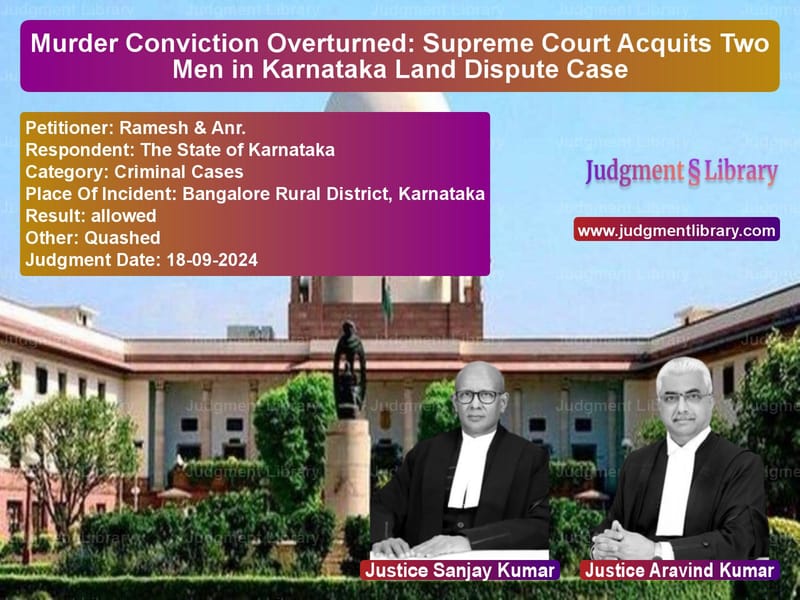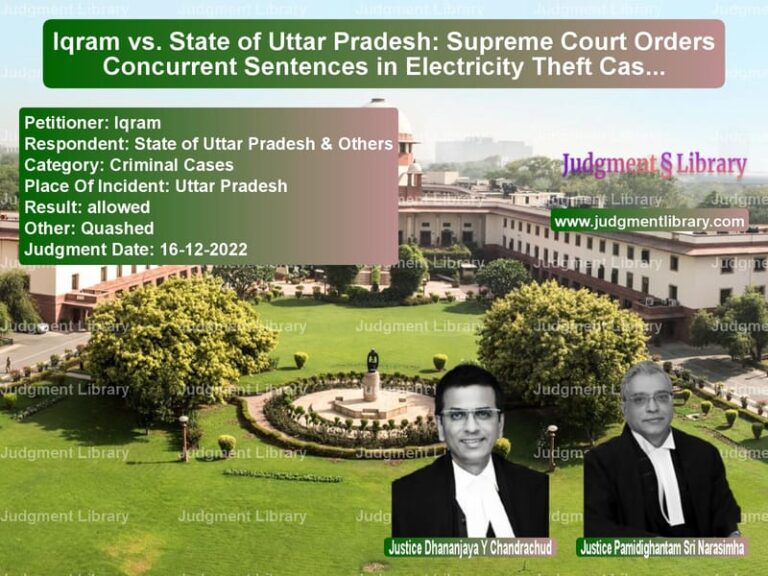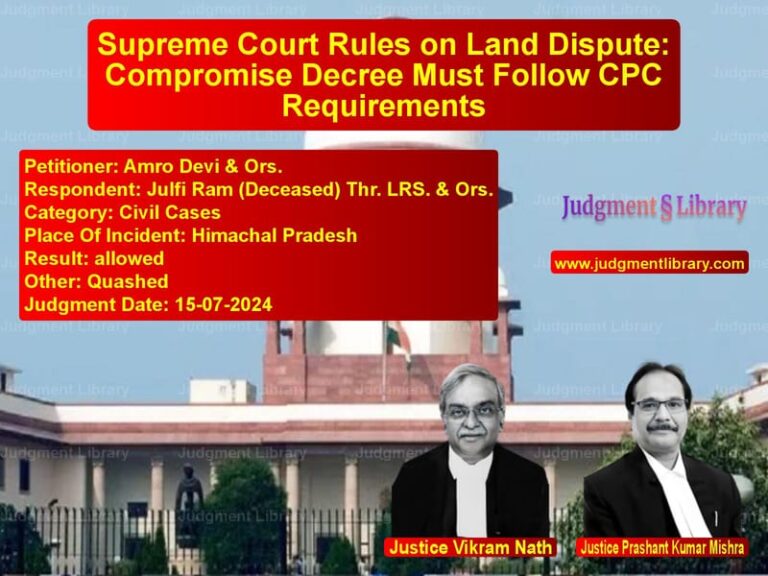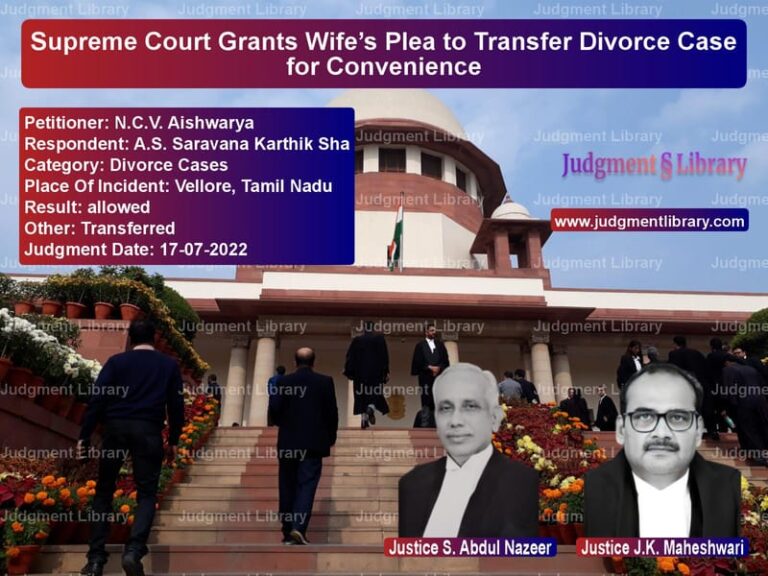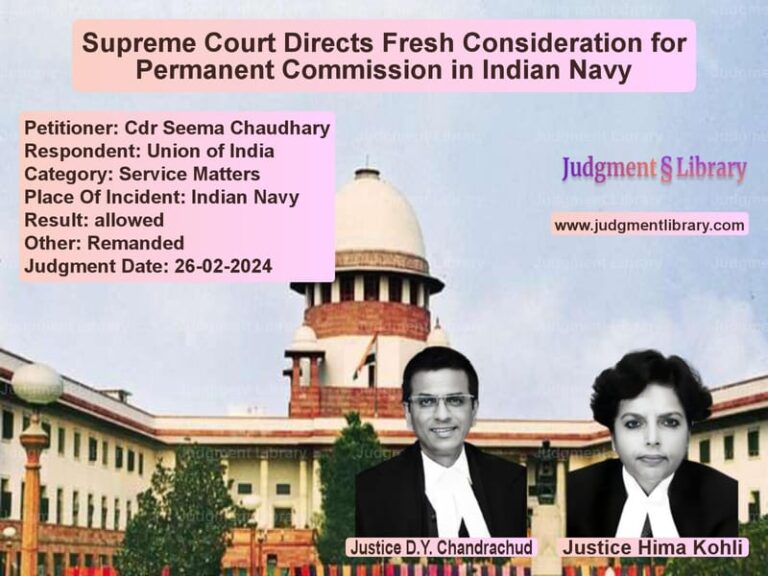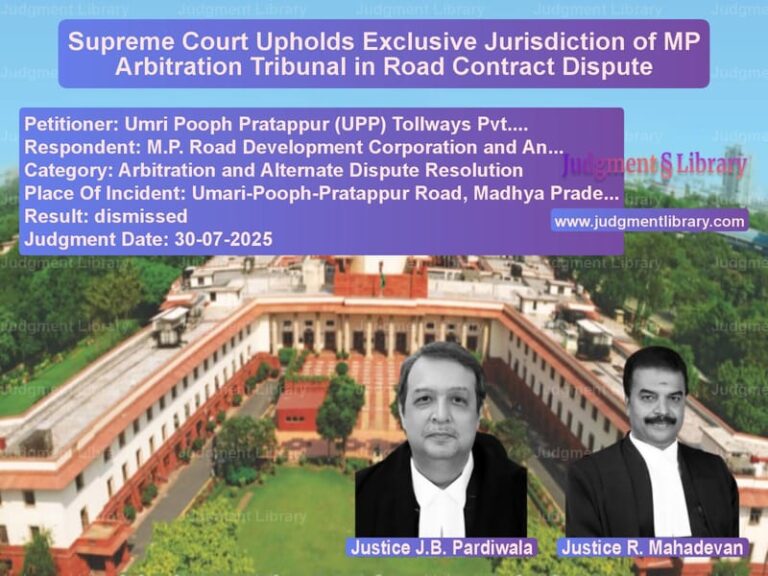Murder Conviction Overturned: Supreme Court Acquits Two Men in Karnataka Land Dispute Case
The Supreme Court of India recently delivered a landmark judgment in the case of Ramesh & Anr. vs. The State of Karnataka, overturning the conviction of two men previously sentenced to life imprisonment for murder. The case revolved around the killing of Babureddy in 2005, which allegedly resulted from a dispute over a land sale in Bangalore Rural District. This judgment is significant as it highlights the importance of reliable witness testimony, the burden of proof in criminal cases, and the principles governing the reversal of acquittals.
Background of the Case
The case originated from an incident that occurred on February 7, 2005, near the Hullahalli Gate Bus Stand in Bangalore Rural District. The prosecution alleged that the appellants, Ramesh and another individual, along with three other accused, conspired to murder Babureddy over a real estate transaction gone wrong. According to the prosecution, the accused ambushed the victim with deadly weapons, including longs (swords), choppers, and knives, leading to his death.
Initially, all five accused were acquitted by the Trial Court in 2006 due to insufficient evidence. However, in 2011, the Karnataka High Court reversed this acquittal and convicted all five under Sections 143, 147, 148, 120B, and 302 read with 149 of the Indian Penal Code (IPC). The appellants, Ramesh and another individual, challenged this decision before the Supreme Court, arguing that the High Court had improperly reversed their acquittal without sufficient grounds.
Legal Proceedings and Arguments
Prosecution’s Case
- The accused had a dispute with the victim over a land sale transaction.
- The attack was premeditated, and the accused used deadly weapons.
- Eyewitnesses confirmed the presence of the accused at the crime scene.
- The victim suffered 21 external and 4 internal injuries, indicating a brutal assault.
Defense’s Arguments
- The identification of the accused was unreliable due to inconsistencies in witness statements.
- None of the independent witnesses corroborated the prosecution’s version.
- There was no forensic evidence linking the accused to the crime.
- The prosecution failed to establish the accused’s presence at the scene beyond a reasonable doubt.
Supreme Court’s Observations
Justice Sanjay Kumar, delivering the judgment, noted:
“The burden of proving guilt beyond reasonable doubt lies squarely on the prosecution. The High Court erred in reversing the acquittal without recording firm and weighty reasons.”
The Supreme Court found several inconsistencies in the prosecution’s case:
- The eyewitness testimonies were inconsistent regarding the sequence of events and the role of the accused.
- There were unexplained delays in recording key witness statements, raising doubts about their reliability.
- The High Court had not provided specific reasons for overturning the acquittal.
Analysis of Eyewitness Testimony
The prosecution relied heavily on the testimonies of M. Ramaiah (PW-1), Munikrishnappa (PW-2), and Venkatesh (PW-3). However, the Supreme Court noted several contradictions in their statements:
- M. Ramaiah claimed that multiple accused attacked the victim, but his account changed during cross-examination.
- Munikrishnappa initially stated that he accompanied the victim to the hospital but later said he remained at the crime scene.
- Venkatesh provided contradictory statements about how the victim was transported to the hospital.
- The alleged involvement of an autorickshaw was inconsistent with witness testimonies.
The Court emphasized that such discrepancies created serious doubts about the reliability of the prosecution’s case.
Key Findings and Judgment
- The Supreme Court ruled that the prosecution failed to prove the guilt of the accused beyond a reasonable doubt.
- It held that the High Court did not justify its reversal of the acquittal properly.
- The conviction under Sections 143, 147, 148, 120B, and 302 read with 149 of the IPC was overturned.
- The appellants were ordered to be released immediately.
Principles Governing Reversal of Acquittals
The Supreme Court reiterated the principles established in Chandrappa vs. State of Karnataka (2007), stating:
- An appellate court has full power to review and reappreciate the evidence upon which an acquittal is based.
- The presumption of innocence is reinforced when an accused has been acquitted.
- If two reasonable conclusions are possible, the appellate court should not disturb the acquittal.
Implications of the Judgment
This ruling has significant implications for criminal law in India:
- Reaffirmation of the Presumption of Innocence: If reasonable doubt exists, an accused must be acquitted.
- Higher Standards for Eyewitness Testimony: Courts must scrutinize testimony for consistency.
- Respect for Acquittals: A reversal of acquittal must be based on compelling evidence.
- Ensuring Fair Trial: The burden of proof lies solely on the prosecution, and accused individuals must not be convicted based on weak evidence.
Conclusion
The Supreme Court’s decision in Ramesh & Anr. vs. The State of Karnataka reinforces the fundamental principle that a person cannot be convicted unless their guilt is proven beyond a reasonable doubt. The judgment ensures that courts exercise caution when reversing acquittals and uphold the rights of the accused to a fair trial.
Petitioner Name: Ramesh & Anr..Respondent Name: The State of Karnataka.Judgment By: Justice Sanjay Kumar, Justice Aravind Kumar.Place Of Incident: Bangalore Rural District, Karnataka.Judgment Date: 18-09-2024.
Don’t miss out on the full details! Download the complete judgment in PDF format below and gain valuable insights instantly!
Download Judgment: ramesh-&-anr.-vs-the-state-of-karnata-supreme-court-of-india-judgment-dated-18-09-2024.pdf
Directly Download Judgment: Directly download this Judgment
See all petitions in Murder Cases
See all petitions in Bail and Anticipatory Bail
See all petitions in Custodial Deaths and Police Misconduct
See all petitions in Judgment by Sanjay Kumar
See all petitions in Judgment by Aravind Kumar
See all petitions in allowed
See all petitions in Quashed
See all petitions in supreme court of India judgments September 2024
See all petitions in 2024 judgments
See all posts in Criminal Cases Category
See all allowed petitions in Criminal Cases Category
See all Dismissed petitions in Criminal Cases Category
See all partially allowed petitions in Criminal Cases Category

